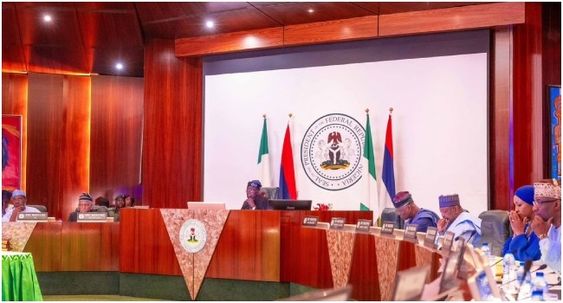Headlines
Protest and Inflation Top Agenda at Today’s Council of State Meeting

Today’s Council of State meeting will focus on major issues including ongoing protests and rising inflation. The discussions are expected to address these pressing concerns and explore potential solutions to stabilize the situation.
At noon today (Tuesday), President Bola Tinubu will convene a Council of State meeting at the Aso Rock Villa in Abuja, with attendance expected from all living former presidents and heads of state.
In the upcoming meeting on Tuesday, which is his first since assuming office 14 months ago, members will focus on reviewing recent nationwide events such as food security issues and national security concerns in light of the #EndBadGovernance protests along with discussing economic matters.
It has been 18 months since the council convened on February 10, 2023, during the presidency of previous leader Muhammadu Buhari.
Buhari had summoned a meeting to discuss the 2023 elections, as well as address crises arising from the new naira policy and fuel shortages.
According to insiders familiar with the meeting’s objectives, our correspondent was informed that President Tinubu and his predecessors will be engaging in discussions on seven major topics.
An anonymous source disclosed that the President intends to deliver presentations titled “The Impact of Nationwide Protest on National Security and Economic State.”
Food security issues will also be a topic of discussion by the President.
According to the source, Tuesday marks the Council of State’s first meeting since this President assumed office as their previous gathering was held on February 10th, 2023.
It is anticipated that Muhammadu Buhari, Goodluck Jonathan, Yakubu Gowon, Olusegun Obasanjo, Abdulsalami Abubakar and Ibrahim Babangida – all former Presidents and Heads of State – will attend.
There will be a presentation by the President covering seven important subjects including: the impact of nationwide protests on national security, the current state of economy and food security – particularly in regards to affordability within agriculture; building upon progress made in solid mineral growth through consolidation. Renewed hope for planning and budgeting that sustains development, as well as reinvigorated interest in strengthening infrastructure relating to roads, industry enhancement towards transformational growth also feature prominently during this scheduled speech.
Days following a one-million-man march by Nigerian youths in the Federal Capital Territory of Abuja to mark the 10th day of nationwide protests against high living expenses, the council convened despite low attendance.
On August 1, during the initial stages of the protest, there was widespread violence and destruction of property that resulted in loss of life across various regions.
It was observed on Saturday, August 3, 2024 that certain protestors in Kano State were brandishing what seemed to be the Russian flag. Videos and photographs rapidly circulated across social media platforms displaying demonstrators from the northern state waving the said flag while shouting slogans in Hausa dialect denouncing inefficient governance with cries like “We don’t want bad government.”
A constitutional body of the Nigerian government, known as The National Council of State, is responsible for providing advice to the executive on matters related to policy-making and performs various other functions.
The members of the committee are composed of several individuals, namely: the President (who assumes its role as a chairman), Vice President, former Presidents and Heads of State, previous Chief Justices in Nigeria, Senate President Speaker for House Representatives Attorney-General belonging to Federation Secretary towards Government about this exact same federation plus every state governor.
Primarily advisory in nature, its function is to provide guidance and assistance to the President when making decisions related to national security, appointments, and economic policies.
Upon the request of the President, crucial national matters such as but not confined to national security, economic hindrances and selection of imperative public officials like Independent National Electoral Commission’s chairman and members, National Population Commissions’ appointees along with Police Service Commission are discussed in a meeting held by the Council.
Moreover, the Council provides recommendations on how to exercise the President’s authority in granting pardons and commutations. These gatherings are usually summoned by the head of state and occur irregularly – only when urgent issues arise that demand insights from past as well as present leaders.
